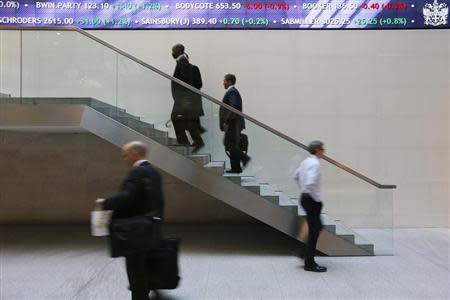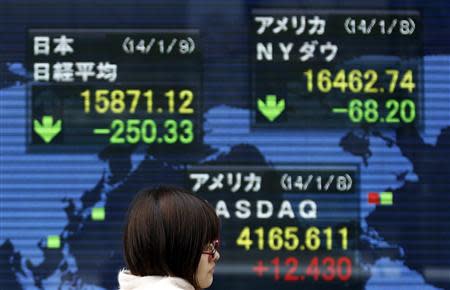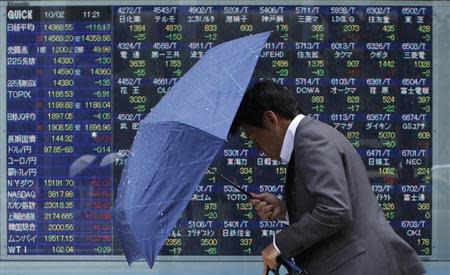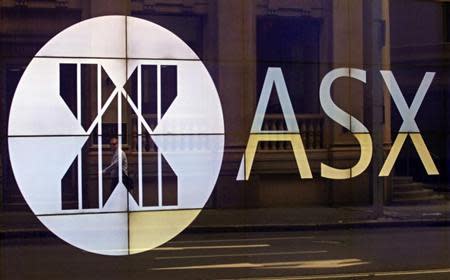Stocks slip; caution reigns before U.S. payrolls
By Ryan Vlastelica NEW YORK (Reuters) - Stock markets around the world fell on Thursday as investors took profits following recent steep gains and were reluctant to buy ahead of the closely watched U.S. payrolls report on Friday. While recent data has indicated improving economic conditions, Friday's payrolls report will be the first since the Federal Reserve announced a slowing of its stimulus program last month. There may be some increased expectations for the data to justify the market's recent rally. Strong economic indicators on Thursday, including an index on European sentiment and U.S. jobless claims, were not enough to drive optimism. U.S. initial jobless claims fell more than expected in the latest week, while a euro-zone sentiment index jumped to a 29-month high in December. "The numbers continue to be good and that should eventually push the market higher, but there's a lot of exhaustion after the strong push we had in December," said Bruce McCain, chief investment strategist of Key Private Bank in Cleveland. "We're waiting for the payroll report to assess where we go from here." The European Central Bank and the Bank of England both kept interest rates unchanged on Thursday, at 0.25 percent and 0.5 percent, respectively, but markets were on alert for any signs of future ECB monetary stimulus moves or shifts in the economic outlook. The ECB's president, Mario Draghi, has been at pains in recent months to stress that the bank is prepared to ease its record low interest rates below 0.25 percent and test out other more unconventional policy options if necessary. The Dow Jones industrial average <.DJI> was down 38.02 points, or 0.23 percent, at 16,424.72. The Standard & Poor's 500 Index <.SPX> was down 3.01 points, or 0.16 percent, at 1,834.48. The Nasdaq Composite Index <.IXIC> was down 17.92 points, or 0.43 percent, at 4,147.69. The benchmark 10-year U.S. Treasury note was up 6/32, with the yield at 2.9708 percent. U.S. investors were also looking ahead to the coming earnings season, with aluminum maker Alcoa Inc , a Dow component, reporting after the market closes on Thursday. "This is the 'show me' year in terms of earnings," said Bill O'Neill, head of wealth management research at UBS. "You have to see an improvement." The FTSEurofirst-300 index of European shares <.FTEU3> fell 0.4 percent, as did the MSCI International ACWI Price Index <.MIWD00000PUS>. Tokyo's Nikkei 225 index <.N225> slid 1.5 percent. A sharper-than-expected slowdown in China's annual consumer inflation in December caused some anxiety in Asia, with China's Shanghai Composite Index <.SSEC> down 0.8 percent. In currency markets, the pound was at $1.6456, up less than 0.1 percent against the dollar, while the euro was up 0.1 percent at $1.3588. The U.S. dollar index <.DXY> was flat against a basket of currencies. "Draghi sounded very cautious on the outlook for growth and said inflation would remain subdued," said Omer Esiner, chief market analyst at Commonwealth Foreign Exchange in Washington, D.C. "By his own account, Draghi's language on accommodative policy 'showed firmer words,' which contrasted the outlook for Fed policy and sent the euro sharply lower this morning," he said. COPPER FALLS Among commodities, gold was 0.2 percent higher following a two-day decline. Copper, highly sensitive to the cooling economic outlook for top metals consumer China, tumbled 1.6 percent in its biggest one-day drop since November. "I'm a bear on copper prices -- I think $7,000 is a more sustainable level," said Helen Lau, a senior commodities analyst with UOB Kay Hian. "The dollar will continue to strengthen because of U.S. tapering, and China's economic growth is slowing down." U.S. crude futures fell 0.6 percent to $91.77 a barrel while Brent crude slipped 0.3 percent to $106.87 per barrel. Both pared early gains after news that production was restarting at a key North Sea oilfield and as the market weighed Libya's resolve to get oil exports on track. (Editing by Chris Reese, Jan Paschal and Leslie Adler)







